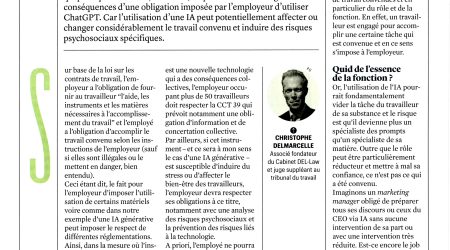Replacement of an employee by AI, unreasonable? (Trends - 14-09-2023)
Posted the 25 October 2023Can an employer justify the dismissal of a worker by replacing him with AI or a robot?
Since 2014, Belgian legislation has provided an obligation to justify the dismissal of a worker on an indefinite-term contract of more than 6 months. Indeed, the collective agreement (CCT) 109 requires the employer to justify the dismissal either because of the worker's ability or behavior or the needs of the company's operations.
Given the latest developments in this area - in 2018, 47% of companies already used AI and in some countries like Korea there are nearly one robot for every 10 workers -, can an employer validly justify the dismissal of a worker by replacing him with AI or even a robot?
Currently, it must be acknowledged that the implementation of AI or robots undoubtedly results from a company restructuring that can be argued to meet its operational needs, for example to speed up order processing, optimize travel, increase profitability, etc.
The employer could therefore validly justify the dismissal by replacing the worker with AI or a robot as part of a company reorganization and the introduction of new technology, which case law has already confirmed in cases of abusive dismissal.
Does this mean that no safeguards exist?
No, because the employer must not only justify a reason related to the needs of the company's operations and that this reason is real, but also, when dismissing the worker, adopt the behavior of a normal and reasonable employer. The exercise of the right to dismiss can therefore be checked even in the presence of a valid reason in light of what would be the exercise of this right by a normal and reasonable employer. This is at the discretion of the court.
Thus, dismissing a worker for this reason a few months before retirement could be considered manifestly unreasonable, with the employer simply waiting for his retirement.
In the case of a dismissal recognized as "manifestly unreasonable," the employee could receive between 3 and 17 weeks of pay in addition to his notice indemnity.
However, it must be acknowledged that this control remains limited except in very specific cases.
Given the societal cost of the loss of many jobs - up to 30% - not necessarily replaced by new jobs related to AI (ethical manager, cognitive scientist, data miner, analyst, etc.), some may question the need to tighten the justification for dismissal in this respect.
That being said, the implementation of AI or robots requires prior information and consultation with the company council or the trade union delegation. Not to mention that an opinion from the Committee for Prevention and Protection at Work is normally required given the potential impacts on well-being at work, in addition to updating the overall risk prevention plan and the annual action plan. In my opinion, the development of an internal emergency plan should also be considered to address any malfunction.
Failure to comply with these obligations could allow the worker to claim damages for abusive dismissal in addition to the CCT 109.
Related articles

Is an employer allowed to mandate the use of artificial intelligence tools by employees ? (Trends, 17-07-2025)

Caution if a former colleague opposed to your employer asks you to testify in their favor
